Latest articles
2025.01.01
2024.10.31 Updated
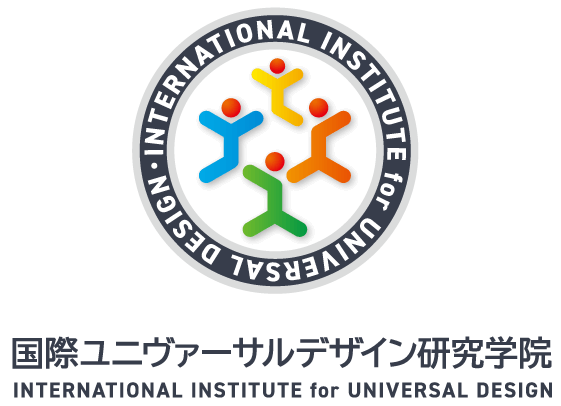
The International Association for Universal Design (IAUD) will open its second phase of the International Universal Design Research Course in April 2025.
In the second phase, the IAUD will start inviting students from all over the world.
In addition, UD experts from abroad will join the lecturers/tutors, making the curriculum even more diverse and comprehensive. Classes will be conducted via an AI live interpretation function, so there will be no need to worry about mutual communication with foreign lecturers/tutors and students.
Opening of the 2nd International Universal Design Research Course
Recruitment deadline: March 31, 2025
Universal design (UD) is the design of living environments, buildings, products, systems, services, etc., with the intention from the beginning to be accessible and usable to as many people as possible.
At IAUD, we take it a step forward and believe that creating a safe and secure social environment that respects the humanity of each individual is the essence of universal design. This Research Course for Universal Design aims to develop human resources who understand the various issues surrounding us from a broader perspective, discover issues on their own, and take action to solve them.
Based on this aim, we seek students as follows:
As a prerequisite for attending a research course, students must meet either of the following requirements:
The term of the course is one year (30 weeks in total, 15 weeks in the first semester and 15 weeks in the second semester), and the tuition is 600,000 yen per year. However, IAUD members can take the course at the member discount price of 480,000 yen and students at the student discount price of 300,000 yen.
In addition, a group discount of 40% off the course fee is available for companies, organisations and municipalities with a minimum of 10 people applying for the course. However, please note that this group discount cannot be used in conjunction with membership or student discounts mentioned above.
Universal design (UD) is an act of creating a living environment that contributes to society. It is necessary to acquire basic skills that can cope with social changes and technology, and to establish knowledge and skills that can cope with globalization. We will train socially responsible UD professionals with a certain level of expressive skills and a rich sense of humanity.
The curriculum is designed to enable students to learn basic and specialized methods and skills by preparing options from a variety of UD areas according to their preferences and abilities, and to achieve the following achievement goals.
16 credits (compulsory: 6, elective: 10) are required to obtain a Diploma (PgDip). A thesis is not required, but students must pass the exams or report submissions required for each subject.
Students who have completed the requirements of the courses and earned 16 credits are awarded a Diploma (PgDip), as shown below.

Underlined subject names can be clicked on to jump to the syllabus.
| Subject | Style | compulsory | elective | remarks |
|---|---|---|---|---|
| General Study for Universal Design | Lecture | 2 | General Study | |
| Universal Design around the World | Lecture | 2 | General Study | |
| Inclusive Society in Norway | Lecture | 2 | Design Management | |
| Tourism for All in Europe | Lecture | 2 | General Study | |
| Universal Design in India | Lecture | 2 | General Study | |
| Universal Fashion in India | Lecture | 2 | Design Management | |
| Universal Environment for Sustainable ASEAN and Beyond | Lecture | 2 | Environmental Design | |
| Advanced Study for Universal Communication | Lecture | 2 | Communication Design | |
| Advanced Study for Environmental Design | Lecture | 2 | Environmental Design | |
| Advanced Study for Universal Design Management | Lecture | 2 | Design Management | |
| Advanced Study for Universal Signage | Lecture | 2 | Communication Design | |
| Advanced Study for Mobility Universal Design | Lecture | 2 | Industrial Design | |
| Advanced Study on Building Design | Lecture | 2 | Environmental Design | |
| Advanced Study for Universal Tourism | Lecture | 2 | Design Management | |
| Advanced Study for Universal Housing | Lecture | 2 | Environmental Design | |
| Advanced Study for Universal Town Planning | Lecture | 2 | Environmental Design | |
| Advanced Study for Sustainable Design | Lecture | 2 | General Study | |
| Advanced Practice for Universal Design | Lecture/ Practice |
4 | UD certification Program, Advanced level | |
| Advanced Practice for Inclusive Design | Lecture/ Practice |
2 | Workshop | |
| Advanced Practice for Sustainable Design | Lecture/ Practice |
2 | Workshop | |
| Final Research | Practice | 4 |
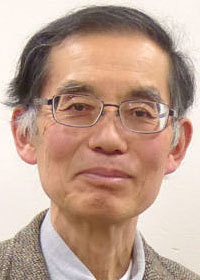
Dr of Engineering
Professor Emeritus, Shizuoka University of Art and Culture
Guest Researcher, Building Research Institute
Specialized in research on building use and safety, universal design and inclusive design. Published many papers and book chapters related to the topic. Several books in Japanese were published as well.
Developed draft design guidelines of dwellings for the ageing society, whose basic concept became the norm in Japan.
Received several awards such as Ron Mace Designing for the 21st Century Award, Include 2003 Award, etc.
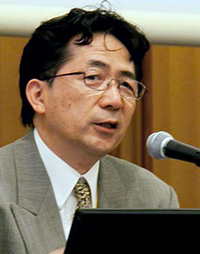
Industrial Designer
President, KIDStudio Corporation
Professor Emeritus, Nagoya University of Arts and Sciences
Executive Director, International Association for Universal Design
Member of IAUD International Design Award Selection Committee
Keiji Kawahara graduated from Department of Industrial Design, Kyushu Institute of Design (then Kyushu University), Japan in 1976 with a Bachelor of Design, and completed Postgraduate Advanced Course at KID in 1977. Then he graduated from the School of Industrial Design, Royal College of Art, London in 1980 with a Master of Design, MDes(RCA).
He founded the design office Kawahara ID Studio in 1981, then established KIDStudio Corporation in 1988 and became President.
He held various posts including a member of a variety of public deliberative assemblies, such as a Judge of Good Design (G-Mark) Products Selection System, Ministry of International Trade and Industry, and a Coordinator of the Product and Development Committee, Tokyo Creative Committee.
He had a serial column “Yasashii-Ippin” (User-Friendly Products) in Asahi Shimbun newspaper, and contributed articles for Nikkei newspaper, Gakken Co., Ltd., and a variety of trade magazines about food and nursing care etc. He gave lectures for local governments, academic societies, and public service organizations, and also gave lectures on Universal Design in UK, Germany, Spain, Norway, Korea, and Hong Kong.
He received various prizes such as first prize in the Industrial Design competition for Zinc Die-casting for Braille Label Marker, UK, Governor of Osaka Prefecture Prize in the 2nd International Design Competition for Natural Fiber Reinforced Plastic Biogas Plant, Japan Design Foundation, and a Good Design Award for a Platform Safety System, and his Barrier-free Kitchen was selected into the Universal Design Exemplars.
He has been specializing in designing for handicapped people since 1970s and been involved in the planning and development of a wide range of products such as industrial equipment, information tools, housing equipment, and medical and welfare devices etc. Especially in the field of universal design and sustainable design, he is an expert of product development related with social issues.
He organized the International Conference for Universal Design in Japan 2002 and served as its promoter / member of Executive Committee / Secretary General, then founded the International Association for Universal Design (IAUD) in November 2003, of which he became Executive Director.
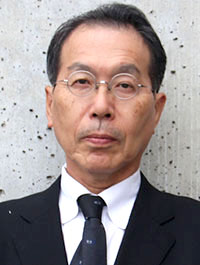
Professor Emeritus of Kyoto Institute of Technology
Designer/Design Theory, Ergonomics, Regional Research, Design Management
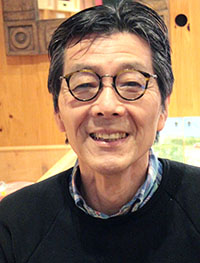
Advisor to the Design Club, Department of Design, Faculty of Media and Arts, Nagoya University of Arts and Sciences.
Director of the International Council for Universal Design, Director of the Chubu Design Association.
Major in industrial design, transportation design and universal design.

Design consultant
President, open house inc.
Website: http://openhouse.co.jp/
Fumikazu Masuda was born in 1949 in Tokyo, Japan. After he graduated from Tokyo Zokei University, he started his own design office in 1978. open house inc. was established in 1991.
He has worked mainly on projects for major Japanese industries, including electric home appliances, transportation, and many other products.
The latter half of his career has been dedicated more to work for local SMEs as a design consultant while studying and teaching at design schools.
He is currently specialized in the field of Design for Sustainability, including Eco-Design, Universal Design, Kids’ Design and Design for the cause.
He has hosted “Destination”, the International Conference of Design for Sustainability (ICDS), every year from 2006 to 2016.
He moved the headquarter of open house Inc. to a rural area in Yamaguchi prefecture from mid-city Tokyo in 2013 to realize a sustainable way of working and living.
Good Design Awards, Fellow, Former Jury, Former Chair Member Kids Design Awards, Jury Chair Wood Design Awards, Wood Products Category Judge IAUD Design Awards (International Association of Universal Design), Vice Chair of the Selection Committee Good Life Awards, Chairman Nagoya University of Arts and Sciences, Visiting professor Animal Conference on the Environmental (ACE), Advisor Spedagi Japan inc, Advisor
Books: "Strategic Environmental Management Ecodesign: 100 Best Practices" Yamamoto Ryoichi & Masuda Fumikazu (1999 - Diamond Inc.), "Ecodesign" Asai Haruhiko & Masuda Fumikazu (2010 - University of Tokyo Press), “Shapes of memories” (English Edition) Fumikazu Masuda (2018 – Kindle Edition), “Ask the Animals - Japan & Australia Edition: Animal SDGs” Fumikazu Masuda & Ian Tsutsui (2024 - Kindle edition) English edition., “Ask the Animals - Japan & Australia Edition: Animal SDGs” Fumikazu Masuda & Ian Tsutsui (2024 – NURUE) English edition.
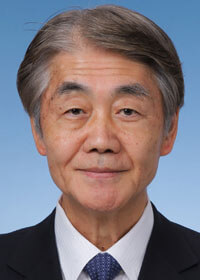
Conceptual Artist
President of Miz-Design Miz Design Office
Development of PICTLOGO:
Concept "All visuals transcend language" by Miz-Design
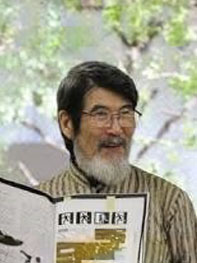
Visual Communication Designer
Former professor of the Design Department, Tama Art University
Former president of Japan Society for Science of Sign
President of Pictogram Institute Ltd.
Councilor of Japan Society for Science of Design
Representative of Yukio Ota Design Associates
Chair Director of NPO Sign Center
Councilor of International Association for Universal Design
Born in 1939 / Graduated from Tama Art University / Completed course at Venice National Art Institute in Italy / Research and invent of LoCoS in Italy in 1964 / After serving as assistant professor at Tokyo Zokei University and founding Pictorial Institute, invited to Munich University in West Germany and National Research Institute of the United States EWC to participate in international project “Visualizing Global Interdependencies” coordinated by Aaron Marcus / Symbol mark and CI design for Japanese Government’s Ministry of Economy, Trade and Industry / Production of “The World of Symbol Marks” for semi-government NHK television program / Sign design of global standardized emergency exit and evacuation area pictogram / design for the safety signs of working space for the Japan Industrial Safety & Healthy Association / supervise the Refuge Guidance Sign Total System to deal with complex disaster / Earliest computer animation design titled “Sharing for Servival” for The United Nations University / Founded the Japan Society for Science of Signs / Serving as one of key member of ISO committee of graphical symbol in Japan more than 30 years /
Awards: SDA(Japan Sign Design Association) Award Gold medal for sign communication design of Keio Gijuku Yochisha / SDA Award Grand prize for emergency exit sign design and many other prizes and awards.
Books: “New Picture language LoCoS” Kodansha 1973 / “World of Visual Words-Graphic Symbols”(coauthor) Japanese Standards Association 1983 / A Pictorial Book of Signs(five volumes)” (coauthor) Akane Shobo 1987 / “Pictogram Design” Kashiwashobou 1987 / “Sign Communication(two volumes)” Kashiwashobou 1989,1993 / “A Story of Pictogram” Japan Standards Association 1993 / “JISHA Safety Signs” Japan Industrial Safety & Helthy Association 1995 / “Encyclopedia of Semiotics” (coauther) Kashiwashobou 2002 / “Communication Design (five volumes)”(coauthor) 2009-2012
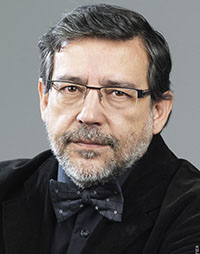
Expert in Design for All / Universal Design, with 30 years of experience as an international consultant in the areas of urban planning, mobility, toursim, industrial design and building.
Born in Barcelona in 1960, he began his professional career in the field of ergonomics and biomechanics.
After expanding his training in biomechanics in Spain and the United States, he obtained a degree in Philosophy and Education Sciences, branch of Therapeutic Pedagogy, at the University of Barcelona, to deepen the psychological processes of learning.
In 1989 he was hired as an Ergonomist by the Barcelona City Council to design a center for the promotion of independent living for people with disabilities, where he came into contact with the problems of accessibility.
He was Director of Accessibility of the Barcelona City Council from 1990 to 1993, being responsible for the preparation of the city for the Olympic and Paralympic Games.
Given the good result of the implementation of accessibility in the city, the Province of Barcelona proposed designing a public consortium responsible for accessibility in the province of Barcelona, where he was director from 1994 to 2000 and where he developed the concept of Design for All / Design for All, which was received massively in Europe and applied in Barcelona's Municipal Plans and, subsequently, in other cities in Spain, Portugal, France and Luxemburg.
During this period, at international level, he was president of EIDD, Design for All Europe, from 1998 to 2001 and participated in a large number of conferences in Europe and America. In 1991 he was accepted as a member of the European Concept for Accessibility, of which he is still a part.
In 2000 he founded the company ProAsolutions SL in Barcelona, specializing in the Design for All consultancy in urban planning and mobility, architecture, industrial design and service companies, and in 2008 he created ProAsolutions.pt Lda, a delegation in Porto, together with his partners Rafael Montes and Nuno Peixoto.
In 2001 he formed the non-profit private foundation of international scope "Design for All Foundation", of which he was president, to spread theory, implementation and good practices worldwide. In 2021 the foundation became the Design for All International association.
He is also patron of the Barcelona Center de Disseny and a member of the Board of the International Association for Universal Design, based in Tokyo. He is also a member of ASEPAU (Spanish Association of Professionals of Universal Accessibility).
During his professional career he has written about twenty books on accessibility and Universal Design applied to urban design and other areas, in English, French, Spanish and Catalan, translated into several languages such as Italian, Portuguese, Mandarin, Turkish and German. He has also written several academic articles and gives lectures all over the world.
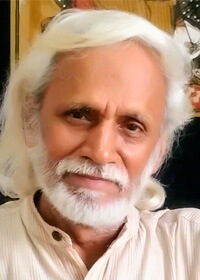
Born in India, Fellow of Royal Society of Arts, UK.
He was conferred the Design Guru, India's highest teaching award (2023) by JKL University, Jaipur . He is the Design Chair at DOT School of Design and Distinguished Professor at the Shiv Nadar Institute of Eminence, Delhi.
He is one of the pioneers who commenced Design Education in India through the National Institute of Design.
He is the only Indian to be conferred the international "Ron Mace Designing for the 21st century" award. His other awards include the Grand jury award for the best Universal design education in the world by the International Association of Universal Designers and Helen Keller (NCPEDP) lifetime achievement award for outstanding contribution for the people with disabilities.
He received the national best product design award from the National Research and Development Council of India. He established Indian government's first Craft Development Institute in Kashmir and was founder dean of DJ Academy of Design in Coimbatore.
His published 11 books including " Thinking Design, Speaking Design and Design approaches ". He was professor emeritus of CEPT University, member of PhD panel , NID; boards of Alagappa University, Jain University, Yenopaya University, Saintgits college of technology and DOT school of design.
Balaram coined the word "majority world" to replace the biased "third / developing world". He is the champion of universal design education in India and responsible for introducing UD as major course in many colleges. He was invited keynote speaker of IAUD six times, wrote and published frequently on the same subject. He is one of the authors who developed the "Universal Design India Principles" in 2011.
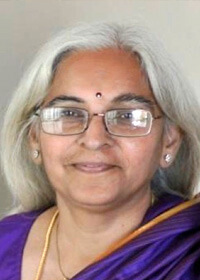
Prof. Padmini Tolat Balaram has completed 5 1/2 years integrated Post Graduation in Industrial Design (Textile Design), and 1 1/2 years of special course in Environmental Design, both from National Institute of Design, (N.I.D), 1980. She holds Ph.D. from CEPT University, Ahmedabad, 2012. For which her major research topic was ‘Movement of Textiles and Textile Motifs between India, China and Japan’. And two minor topics were Handmade Paper Making in Tamil Nadu, and Banana Fibre Extraction in Tamil Nadu.
She has worked as a Chief Designer in Kingkade Fashion, has designed costumes for feature Films Nasibni Balaihari (Gujarati) & Vaasta (Hindi), as well as presented her works in fashion shows and 36 national and international exhibitions of her natural dyed Eco-friendly textiles.
She was appointed as UNDP consultant and Consultant of Development Commissioner (Handicrafts) for making shade cards for dyeing Jute using natural Dyes at ATIRA, also for documenting natural dyes of 16 tribes of North-East India, dyeing Cane and Bamboo using Natural Dyes in Tripura, for identifying plants and restarting dyeing natural fibers using Natural Dyes in Uzbekistan, preparing shadecards for varieties of silks for Madhya Pradesh, by Madhya Pradesh Silk Board, ect.
She has retired as a Prof. of Design and was also Head of Silpa-Sadana, the first Design College set up by Rabindranath Tagore as a part of Visva-Bharati. She has taught as Faculty member at DJ Academy of Design for 6 years and has taught at NID, NIFT, CEPT University as visiting professor, apart from teaching in Japan, China, Taiwan, South Korea, USA, Thailand, etc.
She was awarded 7 international research fellowships from Japan Foundation (thrice), and one from Asia Scholarship Foundation, Fulbright for Teaching at University of Nebraska -Lincoln and travelling grants to teach Morgan State University in USA.
Her book Bastar Textiles, Designs and Natural Dyes has revived Bastar Textiles, bringing them to international fashion shows, as well as creating solid income for the weavers and dyers of Chattisgarh and Orissa States of India. Her work on Natural dyes and natural indigo has revived traditional techniques of manufacturing and using natural indigo and other natural dyes of India and Uzbekistan.
She is also a Co-Founder of Emote Electric Pvt. Ltd. Company was started to reduce air pollution and give high speed electric motorcycle, which can also climb the 40 degrees slopes.
She was also invited as a keynote speaker by international organisation working on Universal Design (IAUD) to Japan, where she also presented a paper demonstrating how to create different fashions by using the same textile by draping it in multiple ways to suit people with disabilities and for normal people to reduce excess use of raw materials, natural resources and pollutions generated by dumping out of fashion and discarded garments, creating large landfills, thus reducing cultivable land.
Her emphasise has always been on Sustainable Design and Creating eco-friendly and healthy clothing.
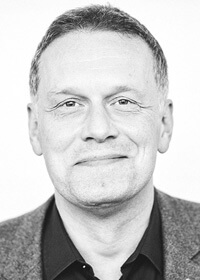

Onny Eikhaug is the founder of Innovation for All AS and was President of EIDD Design for All Europe 2017-2021, and is now Honorary Member.
Since 2021 she is Chair of the Selection Committe for the IAUD Design Award.
She was for more than 13 years Programme Leader at Norwegian Design Council (Design and Architecture Norway), responsible for the Centre's activities in the fields of people centred, inclusive design as a strategy for innovation.
She established and managed the Innovation for All programme, as well as initiating and developing the Innovation Award for Universal Design - presenting inclusive, people-centred design as a practice and an effective tool for innovation in both private and public sector.
She is committed to sustainable, people-centred design and innovation - demonstrating the huge potential of this approach as a powerful and profitable business strategy for innovation. A key aspect of this is presenting and implementing effective, practical tools that can easily be adopted by any organisation or enterprise.
She writes, publishes, lectures, facilitate workshops, provides consultancy and curates exhibitions both in Norway and internationally, and works closely with designers, entrepreneurs, academia, industry, research and government using real projects and other knowledge transfer mechanisms to achieve this.
She coordinates and advices on people-centred design projects with business and public sector, and is frequently a judge in International design jurys.
She is responsible for the books Innovating with People - The Business of Inclusive Design and Innovating with People - Inclusive Design and Architecture as editor-in-chief and author.
Educated at NHH Norwegian School of Economics she has gained a broad executive experience in international marketing, sales, innovation, product development and design management in the fields of personal products, ergonomic lighting, and contemporary furniture having worked for companies such as Unilever and Luxo across Europe and the US.
She was Marketing and Sales Director for a contemporary furniture producer in Portugal as well as Managing Director of a Norwegian Strategic design company.
She was in 2015 appointed Inclusive Design Champion by an international jury at HHCD Royal College of Art, London at the Include conference.

Assistant Professor Antika Sawadsri (PhD)
Dean, School of Architecture, Art, and Design at KMITL
Asst. Prof. Dr. Antika Sawadsri is an accomplished academic and practitioner in sustainable and inclusive design. Her educational and career timeline demonstrates her deep commitment to advancing these fields, espec ially in the context of ASEAN. Below is a detailed overview:
Her comprehensive experience equips her uniquely to teach the course “Universal Environment for Sustainable ASEAN and Beyond,” providing students with a rich blend of theoretical knowledge and practical application.
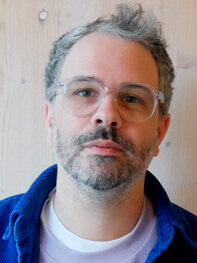
Loïc Marleix is a French independent designer specializing in systems architecture, interfaces, semiotics, and the study of glyphs. A fervent explorer of Unicode, kaomoji, and sub-internet culture, he has designed a free tool to preserve and explore the language constructed by Japanese designer Ota Yukio under the name ‘Lovers Communication System.
| November, 2024: | Start of publicity for student recruitment and admission guide |
|---|---|
| Mid-January, 2025: | Syllabus and timetable announced |
| Early April, 2025: | Start 1st semester of 2nd phase |
| Late July, 2025: | End 1st semester of 2nd phase |
| Mid-October, 2025: | Start 2nd semester of 2nd phase |
| Late February, 2026: | End 2nd semester of 2nd phase |
| March, 2026: | completion ceremony of 2nd phase |
Admission Guide for the 2nd International Universal Design Research Course(PDF:880KB)
Application Form for Universal Design Research Course (MS-Word:50KB)
Application Form for Universal Design Research Course (PDF:118KB)